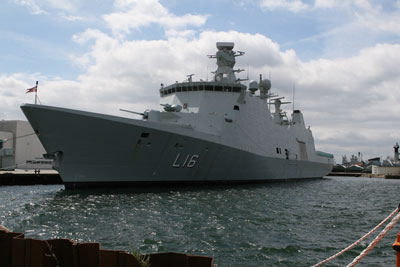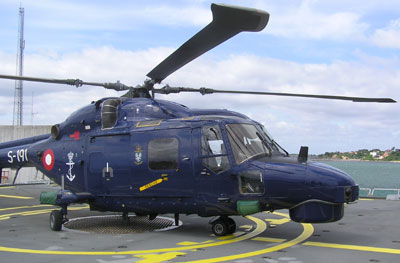| -You are here: 4Navy News4ABSALON to Task Force 150 | ||||||||||||||||||||||||||||||||
|
July 29, 2008ABSALON to Task Force 150:Royal Danish Navy takes Command in the Fight against Terror and PiracyAt the end of August the staff of the Danish Task Group aboard the ABSALON will be taking over command of the international naval force off the Horn of Africa for the next six months.
ABSALON seen here in Korsør, July 2007. By Johnny E. Balsved Around mid-August, the Command and Support ship ABSALON will depart for the Horn of Africa in the Indian Ocean, where the ship later that month will become the command ship, in the international naval force officially known as Task Force 150, or simply TF150. The Command and Support ship will hereby get an obvious opportunity to be tested in a "sharp" international mission to see if it is ready and well qualified to solve its primary role. Heightened security Parts of the media, has in the headlines, described the mission of ABSALON as international pirate hunting, but this may be a little to popular description, of the primary objective of Task Force 150. The main task of TF150 is to take part in the international fight against terror, including preventing smuggling of weapons etc. in the area around the Horn of Africa and the adjacent seas. There is no doubt the force will not sit passively and watch if they encounter any incidents of piracy, but the primary objective is not less serious, as indicated by the heightened security surrounding the deployment of the Command and Support ship. The Danish Fleet Headquarters (SOK) reported to navalhistory.dk "The security level has been heightened, so that the arrival of Danish naval ships in certain ports, must not be made public earlier than one week before taking place. This is the same practice, as that already used by US and UK ships visiting Danish harbors." Fully operational It does not seem as if the Command and Support ship ABSALON has been given the official declaration of 100% operational readiness yet, but it must be a formality, and it must be assumed to be declared so, before the depart for the Horn of Africa. Both Command and Supports ships have been busy during the spring testing the different weapons systems, so that they systems could be declared operational. Sensors and operations room have been in heavy use, and ABSALON has been taking part in several exercises, both nationally and internationally, in the Command and Support role. The crew has also been trained in taking part in international operations. The declaration of fully operational readiness must be just around the corner. LYNX helicopter embarked When the Command ship THETIS was deployed, to support the UN food program earlier this year, it was a source of surprise that no helicopter was embarked. It is determined though, that a Danish LYNX helicopter will be supporting ABSALON during the deployment to TF150. It must strongly be assumed, that it will be one of the armed LYNX helicopters. There is no doubt that deploying a helicopter to such an operation close to Equator will put a lot of strain on both crew and machinery. The prolonged deployment will also be giving special logistic demands, to ensure the helicopter is airworthy during the entire mission. One of the Danish LYNX helicopters has earlier been operating with German naval units in the Mediterranean, but it will be the first time a Danish helicopter is deployed south of the Suez. The helicopter crews have spent considerable time training for this mission during the spring.
LYNX S-191 on the helicopter deck of the
Command and Support ship
ABSALON. Task Force 150 Task Force 150 (TF150), or Combined Task Force 150 (CTF150), is a volunteer multinational naval force, indirectly operating under a UN mandate. Several countries have during the years participated and/or led this naval force, which primarily operates in the area around the Gulf of Aden, the Gulf of Oman, the Arabian Sea, the Red Sea and the Indian Ocean. Naval vessels from Australia, Canada, France, Netherlands, Italy, New Zealand, Pakistan, Portugal, Spain, the United Kingdom, Turkey, Germany and the United States have previously participated. Denmark has not had any ships deployed to this force before, but we have had a liaisons officer assigned to prepare for a future Danish participation. The Task The main task of the Naval Force is so called Maritime Interdiction Operations (MIO), which is control of goods transported in the operation area. In case of larger ships in transit through the area at high speed, like for instance the large MAERSK-containerships travelling between ports in Europe and the Far East, the normal procedure is to just contact them, to hear if they have spotted anything suspicious. Ships in local traffic, which are suspected of transporting weapons or other cargo related to terrorism, will usually be checked by a boarding team (BT). The mission tasks also include Maritime Security Operations (MSO), which is protection of ships and installations in the operation area, Theatre Security Cooperation (TSC), which is support to weak nations in the region and Search and Rescue missions (SAR). All the operations are actually pretty much the same, as those Danish naval units, latest the corvette PETER TORDENSKIOLD, has been taking part in off the coast of Lebanon, during the last couple of years. Related stories:
4 4Next Stop Malta - 08/18/2008 4ABSALON to Task Force 150 - 07/29/2008 4Drones onboard THETIS - 03/15/2008 4Corvette returns home again - 10/21/2007 4OLFERT FISCHER on long-distance assignment - 07/18/2007
- Do you miss a major event on this Site,
Are you able to contribute to the unfolding of
the Danish Naval History, You can also use the Naval Web Forum on this web-site.
|
- |
||||||||||||||||||||||||||||||
|
|
||||||||||||||||||||||||||||||||
|
This page was last updated: - This page was first published: July 29, 2008 (November 10, 2008) |
||||||||||||||||||||||||||||||||
|
Copyright © 2013-2016 Johnny E. Balsved - All rights reserved - Privacy Policy |
||||||||||||||||||||||||||||||||


